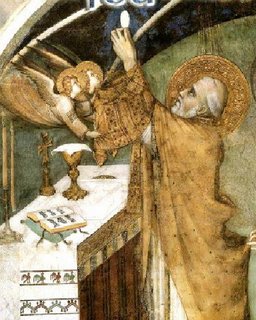St. Irenaeus

Today the Church celebrates the feast day of St. Irenaeus of Lyons. He is one of the early Church Fathers and his writings were very helpful for me to see that the early Christians were Catholic in their beliefs and practices. Irenaeus was a disciple of Polycarp who was a disciple of the apostle John. He spoke on the Eucharist, apostolic tradition, and particularly against the heretical views of the gnostic movement that was gaining ground in the 2nd century.
Here's some of his writings:
"He took from among creation that which is bread, and gave thanks, saying, ‘This is my body.’ The cup likewise, which is from among the creation to which we belong, he confessed to be his blood. He taught the new sacrifice of the new covenant, of which Malachi, one of the twelve [minor] prophets, had signified beforehand: ‘You do not do my will, says the Lord Almighty, and I will not accept a sacrifice at your hands. For from the rising of the sun to its setting my name is glorified among the Gentiles, and in every place incense is offered to my name, and a pure sacrifice; for great is my name among the Gentiles, says the Lord Almighty’ [Mal. 1:10–11]. By these words he makes it plain that the former people will cease to make offerings to God; but that in every place sacrifice will be offered to him, and indeed, a pure one, for his name is glorified among the Gentiles" (Against Heresies 4:17:5 [A.D. 189]).
"If the Lord were from other than the Father, how could he rightly take bread, which is of the same creation as our own, and confess it to be his body and affirm that the mixture in the cup is his blood?" (Against Heresies 4:33–32 [A.D. 189]).
"He has declared the cup, a part of creation, to be his own blood, from which he causes our blood to flow; and the bread, a part of creation, he has established as his own body, from which he gives increase unto our bodies. When, therefore, the mixed cup [wine and water] and the baked bread receives the Word of God and becomes the Eucharist, the body of Christ, and from these the substance of our flesh is increased and supported, how can they say that the flesh is not capable of receiving the gift of God, which is eternal life—flesh which is nourished by the body and blood of the Lord, and is in fact a member of him?" (ibid., 5:2). "In the Church God has placed apostles, prophets, teachers, and every other working of the Spirit, of whom none of those are sharers who do not conform to the Church, but who defraud themselves of life by an evil mind and even worse way of acting. Where the Church is, there is the Spirit of God; where the Spirit of God is, there is the Church and all grace" (Against Heresies 3:24:1 [A.D. 189]).
"[The spiritual man] shall also judge those who give rise to schisms, who are destitute of the love of God, and who look to their own special advantage rather than to the unity of the Church; and who for trifling reasons, or any kind of reason which occurs to them, cut in pieces and divide the great and glorious body of Christ, and so far as in them lies, destroy it—men who prate of peace while they give rise to war, and do in truth strain out a gnat, but swallow a camel. For they can bring about no reformation of enough importance to compensate for the evil arising from their schism. . . . True knowledge is that which consists in the doctrine of the apostles, and the ancient constitution of the Church throughout all the world, and the distinctive manifestation of the body of Christ according to the successions of the bishops, by which they have handed down that Church which exists in every place [i.e., the Catholic Church]" (ibid., 4:33:7–8).
"[I]t is incumbent to obey the presbyters who are in the Church—those who, as I have shown, possess the succession from the apostles; those who, together with the succession of the episcopate, have received the infallible charism of truth, according to the good pleasure of the Father. But [it is also incumbent] to hold in suspicion others who depart from the primitive succession, and assemble themselves together in any place whatsoever, either as heretics of perverse minds, or as schismatics puffed up and self-pleasing, or again as hypocrites, acting thus for the sake of lucre and vainglory. For all these have fallen from the truth" (ibid., 4:26:2).
Labels: Church Fathers




